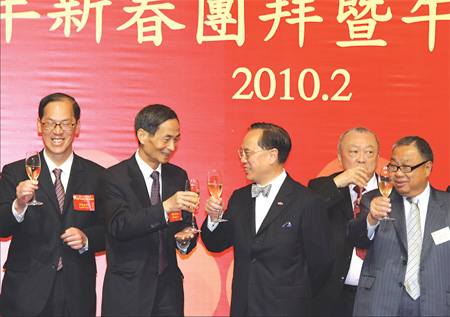Rate of secondary student drug use at 4.3%
Updated: 2010-02-26 07:33
By Phoebe Cheng and Joy Lu(HK Edition)
|
|||||||||
|
Chief Executive Donald Tsang and Li Guikang (2nd left), deputy director of the Central Government's Liaison Office in Hong Kong, propose a toast at a luncheon hosted by Friends of Hong Kong Association yesterday. Tsang emphasized the necessity and merits of the government's anti-drug strategies on campus when meeting the press. Edmond Tang |
Cough syrup and thinner abuse reported by 1.6% of pre-teens
HONG KONG: The drug problem in schools is growing - with younger and younger students abusing drugs, according to the 2008-09 Survey of Drug Use Among Students released yesterday by the Narcotics Division of the Security Bureau.
The survey shows that 4.3 percent of secondary school students have abused drugs - up 1 percent from 4 years ago.
"The problem of prevalence of youth drug abuse is becoming more serious," Secretary for Security Ambrose Lee said. "Out of the 112 secondary schools, only one of them reported that students have not taken drugs while there are 84 out of the 94 primary schools said students have taken drugs before."
The survey was conducted during the 2008-09 school year and was based on questionnaires completed by about 158,000 students anonymously. The survey covered 94 primary day schools, 112 secondary day schools, eight universities and 17 institutions.
Lee said the government will commence public education to try to wake up kids and the community at large by underscoring the harmful effects of drugs among junior primary students.
"This is our first time to have senior primary students included in our survey," Lee said. "It does reveal that drug problems exist among primary pupils. The rate is not too high - about 1.6 percent but it's alarming. We have not neglected this group of pupils and we'll step up our education and promotion starting from primary one. We hope that with our joint effort with the educators, teachers and headmasters, we can erase this unwelcome trend."
The most common types of drugs used by upper primary students were "cough medicines" and "thinner", accounting for 37.5 percent and 30.7 percent, respectively. Secondary students tend to take "ketamine" and "cannabis".
Officials could give no specific reasons for the apparent widening of the drug culture into younger children, other than easy access.
The survey also affirms the hidden subculture of youth drug abuse. Among secondary students who claimed they abused drugs, 36.2 percent said they took drugs in friend's homes while 25 percent took drugs in their own homes. Only about a quarter abused drugs in entertainment venues.
Lee took a conservative approach on the question of whether the Tai Po drug testing trial would become mandatory.
"Mandatory drug testing is very, very controversial which touches on legal issue, human rights issue and maybe technical issues for enforcement," Lee said. "We have not ruled out this option completely. The government will do some research. We will conduct a public consultation exercise later this year to tack on the community sentiment."
Lee also said that he would consider whether the scheme should be promoted among secondary schools or even primary schools in other districts after the evaluation of the Tai Po program in the middle of this year.
About 61 percent of the students studying in Tai Po registered to take part in the trial drug testing scheme. After more than two months of tests, not a single student has tested positive for drugs.
Financial Secretary John Tsang, in his budget address yesterday, announced that an additional HK$3 billion would be injected into the Beat Drugs Funds.
Principal anti-drug measures to be rolled out include opening four new counseling centers for psychotropic substance abusers; strengthening the manpower of District Youth Outreaching Social Work teams; enhancing the Police School Liaison Scheme; increasing the number of police dogs and relevant police posts; stepping up anti-drug publicity work; promoting a community mobilization program and increasing the capacity of youth drug treatment and rehabilitation center subvented by Department of Health.
"The government is committing to combating youth drug abuse along the five strategic directions promulgated by the chief executive," Lee said.
The five directions are community mobilization, community support, drug testing, treatment and law enforcement.
Meeting the press at a luncheon yesterday, Chief Executive Donald Tsang emphasized the necessity and merits of the government's anti-drug strategies on campus.
"Though nobody was tested positive under the voluntary school drug testing program in Tai Po, the number of students seeking help with social workers has markedly increased. This showed the program has positive effects in early intervention and in providing assistance to drug users," he said.
Compared to some Western countries, Hong Kong's situation is not "irremediable" since most students admitting to have taken illicit drugs were only trying them, Tsang said.
He said the trial scheme will be carefully evaluated before deciding whether to roll it out to other schools.
Tsang pledged the government's utmost effort to help students live drug-free lives.
(HK Edition 02/26/2010 page1)
